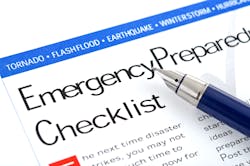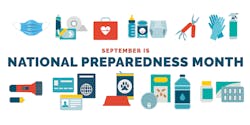PSE&G Advises Customers to Plan for Emergencies
The last few weeks have included painful examples of the increased severity of storms that strike New Jersey. During National Preparedness Month this September, PSE&G encourages its customers to take the necessary steps to safeguard their families, homes and businesses. Emergencies can happen at any time, and preparing ahead of time helps keep everyone safe. PSE&G reminds customers to “Prepare to Protect” themselves and those around them.
“Safety is and has always been our top priority for our customers and employees,” said Paul Toscarelli, director, emergency preparedness. “To help spread the word about the importance of being prepared, PSE&G partners with groups like Sesame Workshop. Taking the time to prepare and having a plan limits the negative impact of an emergency. Prepare and stay aware.”
"PSE&G’s ongoing system improvements and enhancements to the grid help provide excellent service to our customers," the company stated. "PSE&G prepares year-round for extreme weather to maintain reliability, as we are powering progress."
PSE&G infrastructure investments are delivering benefits for its customers, making its distribution systems more resilient to increasingly severe storms. Tropical Depression Ida brought considerable devastation to New Jersey, however, the impacts would have been much worse without those investments.
Hardening New Jersey’s electric and natural gas networks against extreme weather events is a work in progress. PSE&G has made significant headway during the past decade, but there is still much work to be done to protect customers and energy infrastructure against the impacts of climate change.
For those utilities who also want to honor the National Preparedness Month, here’s how PSE&G advises its customers to prepare for a severe storm or other emergency:
- Have a battery-powered radio and fresh batteries.
- Check supply of flashlights, blankets, nonperishable food and bottled water.
- Create an emergency communications plan.
- Develop an evacuation plan.
- Charge cell phones, tablets and other mobile devices.
- Make sure to have cash available. Banks may be closed or inaccessible after a storm.
- Fill up your vehicle’s fuel tank.
- Bring in unsecured objects and furniture from patios and balconies.
- Compile a list of emergency phone numbers.
- Discuss storm and lightning safety with your family. Visit https://nj.pseg.com/safetyandreliability/stormsafety for safety tips.
- Follow PSE&G on Facebook and Twitter for updates before, during and after the storm.
· Also, PSE&G advises its customers to consider downed wires as “live.” They should stay at least 30 ft away from downed lines and don’t go near the pole or anything touching the line. Instead, they should call the utility or report the downed wire by mobile app or on the Web site.
· In addition, to prevent carbon monoxide poisoning, cusomters should not run any gasoline-powered generators in a garage or any other enclosed space. If a person is on life-sustaining medical equipment, they should alert PSE&G in advance and notify local police and fire departments. For more information, visit www.pseg.com/life.

